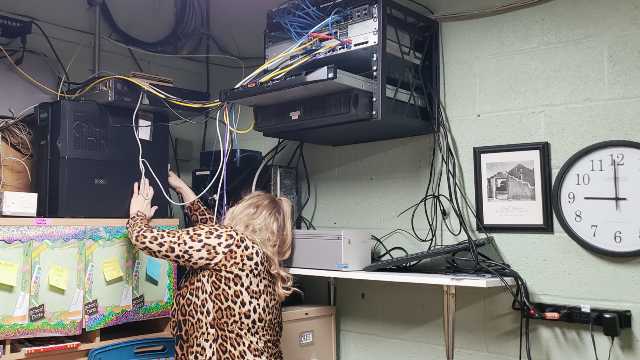By Carol Stiffler
Frustration is mounting at Three Lakes Academy in Curtis, where the small charter school has been dealing with spotty internet coverage for months.
The problem was first noticed after Christmas break: the Wi-Fi signal would drop repeatedly in the day. The connection doesn’t return until a staff member – usually Principal Rachel Bommarito or Secretary Joanne Pann – climbs onto a chair to access the router, unplugging, waiting, and plugging it back in. In the meantime, any of the 128 students in classrooms that may have been using the internet are unable to do so.
Some days, it drops three or four times a day. Report cards were issued about 10 days late. NWEA testing in January, which is done completely online, dragged on and was very difficult to complete on time. Print requests aren’t transmitted to the network printer. Supplemental visual and instructional content delivered via the Internet would launch, then fail to finish.
Principal Rachel Bommarito said she is “horrified” at the unpredictable situation, which has not been clearly diagnosed. Because of all the organizations involved in the school’s internet service, she’s not sure where responsibility lies. The school does not employ an internet technician.
Internet service is delivered to the Three Lakes Academy under a contract issued through the Eastern Upper Peninsula ISD, and is an Astrea product secured through the Michigan non-profit Merit Network. Merit collaborates with schools, hospitals, and nonprofits to bring internet coverage to educational organizations. The hardware installed in the school belongs to the ISD.
“Where does your responsibility end, and mine start? Who can I talk to?” Bommarito said in an interview on Tuesday. “I don’t want a suggestion anymore. I just want it fixed.”
The EUP ISD employs technicians to troubleshoot issues like this. The problem has been hard to diagnose; on the ISD monitor, it looks like Three Lakes never loses internet coverage. A technician arrived in late January to diagnose the issue and installed what they hoped would be a temporary fix while waiting to replace a piece of hardware. It didn’t work.
Teachers, famous for planning a day’s educational pursuits, are now required to make a plan A and plan B – the backup plan that doesn’t require the internet.
In sixth grade math last week, teacher Jay Bitely’s fifth grade students were engaged in an online competition with the signal dropped, and that put an end to the challenge. Bitely has learned to use his personal cell phone as a hotspot after losing the internet signal.
“Students are disappointed, as I scramble to get my computer hooked up to my hotspot so I can pull up a new lesson on the Smartboard,” Bitely said. “I have five online subscriptions that are integral parts of my classroom lessons, and when the internet goes down we have to transition to a new lesson plan.”
Three of those subscription-based programs are purchased by the school, and two are privately funded by Bitely and one of the school’s substitute teachers.
“Lots of money [is] being wasted,” he said.
In early February EUP ISD Superintendent Angie McArthur said in early February that she thought a solution was close. Two ISD technicians spent hours at the school last week, and the problem persists. After escalating the situation, an Ann Arbor-based specialist from Merit is now overseeing it, but no promised date for resolution has been set.
Meanwhile at Three Lakes Academy, teachers are reaching out to media within and outside of the region, and discussing getting state representatives involved.
Special education and math specialist Joyce Robarge has been so frustrated about the poor Internet service that she recently reached out to Michigan State Representative David Prestin and U.S. Representative Jack Bergman for help. She hasn’t received a response yet.
“Most times we don’t have internet past the first hour of the day. All of our work that we need to do on the internet we have to take home and do it,” she said.
Robarge lives 30 miles away from the school and has often had to go home to record data from her learning sessions. Her job requires internet service to record and analyze student progress.
“I have to triangulate my results with students, so triangulation of data includes having different programs that keep recording data for me, other than my running records, so my results don’t look subjective,” she said. “Working as a teacher in this world is all about data. We need to be able to support our results. It makes it a tremendous effort to do that without the internet.”
Robarge thinks the internet situation has been allowed to fester because the school is small.
“If we had a capacity of 1,000 students, I’m sure we wouldn’t be hearing this,” she said. “We need to be the squeakiest wheel, and we’re obviously not.”
Robarge is certain more could be done.
“There should not be a school in our state that doesn’t have access to the same things that every other student should have access to,” she said. “Yes, it’s very frustrating, and our students deserve better. We, as teachers, deserve better.”












